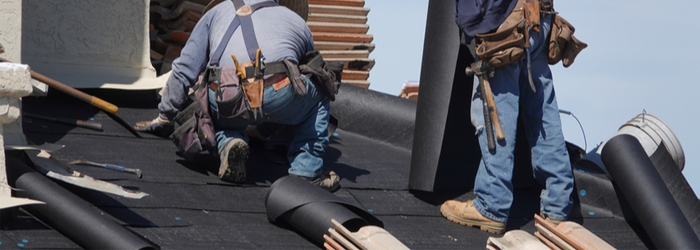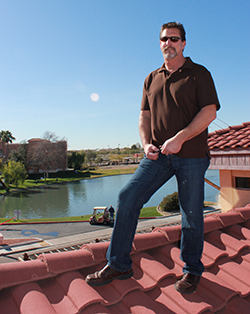What To Look For When Comparing Your Roofing Quotes
 29 March 2022
29 March 2022 

WHAT TO LOOK FOR WHEN COMPARING YOUR ROOFING QUOTES
When it comes to comparing roofing estimates, education is key. Knowing and understanding what you are reading in the quotes and what the estimators are telling you will help you make an informed decision. A new roof can be a costly investment. You want to be as informed as possible before signing a contract. Rosie on the House Certified Partner, Canyon State Roofing offers these tips when evaluating your options and comparing quotes.
1 | NOT ALL 40 POUND UNDERLAYMENTS ARE THE SAME!
 Roofing underlayment is a waterproof barrier material that is directly installed on the roof deck. It lies between the shingles and sheathing, or roof deck, which is generally plywood or oriented strand board (OSB). The underlayment is an added layer of protection from very harsh weather.
Roofing underlayment is a waterproof barrier material that is directly installed on the roof deck. It lies between the shingles and sheathing, or roof deck, which is generally plywood or oriented strand board (OSB). The underlayment is an added layer of protection from very harsh weather.
Some contractor quotes will state they are installing a "40-pound underlayment" with a “20-year warranty." However, they do not mention the manufacturer or the actual name of that underlayment. There are many 40-pound underlayments on the market today, and the quality of them varies greatly. For example, a non-modified, organic 40-pound underlayment is not the same as a modified, inorganic underlayment. An organic underlayment will not last as long. Water, dirt and debris getting lodged in between your tiles and the underlayment is a recipe for a biological attack on organic underlayments. The organic underlayment will break down much more quickly than inorganics. This is why it is important to choose an INORGANIC modified underlayment, or at the very least, a MODIFIED organic underlayment.
2 | A NOTE ABOUT SYNTHETIC UNDERLAYMENT:
Although they are cheaper and easier to install, synthetic underlayment has been proven to fail in as little as two years under tile roofs in Arizona. Any experienced and educated roofer in Arizona should already know that. Western States Roofing Association completed a study on synthetics in our unique desert climate, and the bottom line is, synthetics did not perform well at all. Read the study.

Every roofer has their preferred underlayment based on the what the finished roof product (tile, asphalt, etc.) and the application. That is the reason you have to trust the person you are getting the quote from. Ask about their successful experience with the product in the Arizona environment.
3 | QUANTITY OF REPLACEMENT TILE:
How much is included in the price? Many contractors will only include "up to 100" or "up to one pallet" of replacement tile. This means they will add the extra cost of any extra tiles to your final invoice. Some contractors will include all the tile you need, no matter how much is needed, in the quote.
4 | CONTRACTORS WARRANTY LENGTH:
How long is the contractor’s warranty? While the manufacturer’s warranty is important, too, many contractors only give a five or even two-year warranty on their work. This means, if your roof fails after the contractor's warranty expires, the manufacturer will void your warranty as well if the roof was not installed properly. Then you will be stuck without a warranty for your roof at all. It is best to find a contractor that will give you a contractor’s warranty that is as long or nearly as long as the manufacturer's warranty. For example, Canyon State Roofing provides a minimum 15-year warranty on all their reroofs.
5 | QUALITY MATERIALS MEAN NOTHING WITHOUT A QUALITY INSTALL:
 Please check to ensure that whichever contractor you choose, they are Tile Roofing Institute (TRI) Certified . TRI is the gold standard for providing education on the proper way to install a tile roof. There are a lot of fly-by-night roofers out there who have not been educated in the proper tile roofing techniques. Also, make sure they are appropriately licensed by the Arizona Registrar of Contractors (AZROC). Click "Check A License" for details.
Please check to ensure that whichever contractor you choose, they are Tile Roofing Institute (TRI) Certified . TRI is the gold standard for providing education on the proper way to install a tile roof. There are a lot of fly-by-night roofers out there who have not been educated in the proper tile roofing techniques. Also, make sure they are appropriately licensed by the Arizona Registrar of Contractors (AZROC). Click "Check A License" for details.
6 | NUMBER OF YEARS IN BUSINESS:
Speaking of the AZROC, check their website to see the true number of years the contractor has been in business in Arizona, and whether they have complaints against them. An added benefit to looking up a contractor's license is the ROC clearly lists any complaints a contractor may have right on their listing.
Every company must start at year one. Therefore, it is not necessarily a bad thing if you are having a new company install your roof. But if it’s a new company, and it already has numerous complaints, that’s a red flag. Of course, an established company may have a complaint too. Either way, investigate and consider their number of years in business in your decision-making process.
No matter which contractor you choose, Canyon State Roofing wants you to have a great roof. Use this information as a guide to find the right contractor for your roofing project.
###
Podcast
Jim McLain and Robyn Charland of Rosie-Certified Canyon State Roofing are serious about roofing. Besides traditional shingles, they discuss the advantages and myth about metal roofs and concrete tile, the importance of the underlaying material, why they don't install synthetic underlay, and they explain what's with the peel and stick underlay. Plus explaining roof pitch in regard to installation.
SPONSORED BY: Canyon State Roofing & Consulting
 Canyon State Roofing & Consulting is one of the only Phoenix Valley roofing companies to provide metal roofing services – and we pride ourselves on being the best Arizona provider. With over 20 years in business and a long list of happy customers, our company has earned an incredibly positive reputation among Phoenix Valley homeowners. Canyon State Roofing is an affordable roofing company, backed by airtight warranties, great customer service, quality craftsmanship & quality materials.
Canyon State Roofing & Consulting is one of the only Phoenix Valley roofing companies to provide metal roofing services – and we pride ourselves on being the best Arizona provider. With over 20 years in business and a long list of happy customers, our company has earned an incredibly positive reputation among Phoenix Valley homeowners. Canyon State Roofing is an affordable roofing company, backed by airtight warranties, great customer service, quality craftsmanship & quality materials.
Photo Credit
- Canyon State Roofing
- Shutterstock
Print this page
recent post
- Duck, Duck, Duct! How Often Should Ductwork Be Cleaned?
- Vinyl vs. Fiberglass Windows: Which Is The Better Choice Of Replacement Window?
- We May Be The Grand Canyon State, But The Rocky Mountains Are Important For Arizona
- Welcome to Arizona! Things A Newbie to Arizona Should Know
- The Pros & Cons of Buying A Flipped House
- Getting In On The Ground Floor
- Why It’s More Critical Than Ever To Get Your AC Serviced Before Summer
- The Reality of Remodeling
- What To Look For When Comparing Your Roofing Quotes
- What To Expect When Buying New Windows & Doors
